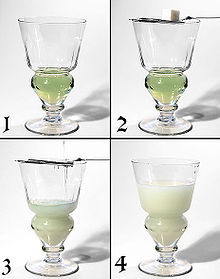- Ouzo effect
-
The ouzo effect (also louche effect and spontaneous emulsification) is a phenomenon observed when water is added to ouzo and other anise-flavored liqueurs and spirits, such as pastis, raki, arak and absinthe, forming a milky (louche) oil-in-water microemulsion. Because such microemulsions occur with only minimal mixing and are highly stable,[1] the ouzo effect may have commercial applications.
Contents
Observation and explanation
The ouzo effect occurs when a strongly hydrophobic essential oil of trans-anethole is dissolved in a water-miscible solvent, such as ethanol, and the concentration of ethanol is lowered by addition of small amounts of water.
In water-immiscible solvents, oil-in-water emulsions are not stable as the oil droplets coalesce until complete phase separation is achieved at macroscopic levels. It is well-known that the addition of a small amount of surfactant or the application of high shear rates (strong stirring) can stabilize the oil droplets.
In a water-rich ouzo mixture the droplet coalescence is dramatically slowed without mechanical agitation, dispersing agents, or surfactants. It forms a stable homogeneous fluid dispersion by liquid-liquid nucleation.[2] The size of the droplets has been measured by small-angle neutron scattering to be on the order of a micrometre.[3]
Using dynamic light scattering, Sitnikova et al.[1] showed that the droplets of oil in the emulsion grow by Ostwald ripening, and that droplets do not coalesce. The Ostwald ripening rate is observed to diminish with increasing ethanol concentrations until the droplets stabilize in size with an average diameter of 3micrometre.
Based on thermodynamic considerations of the multi-component mixture, the emulsion derives its stability from trapping between the binodal and spinodal curves in the phase diagram.[3] However, the microscopic mechanisms responsible for the observed slowing of Ostwald ripening rates at increasing ethanol concentrations appears not fully understood.
Applications
Microemulsions have many commercial uses. A large range of prepared food products, detergents, and body-care products take the form of emulsions that are required to be stable over a long period of time. The Ouzo effect is seen as a potential mechanism for generating surfactant-free microemulsions without the need for high-shear stabilisation techniques that are costly in large-scale production processes. It has been conjectured[4] that the synthesis of a variety of dispersions such as pseudolatexes, silicone emulsions, and biodegradable polymeric nanocapsules, have been synthesized as a result of the ouzo effect.[clarification needed]
See also
References
- ^ a b Sitnikova, Natalia L.; Rudolf Sprik, Gerard Wegdam and Erika Eiser (2005). "Spontaneously Formed trans-Anethol/Water/Alcohol Emulsions: Mechanism of Formation and Stability" (PDF). Langmuir 21 (16): 7083–7089. doi:10.1021/la046816l. PMID 16042427. http://www.science.uva.nl/~sprik/personal/pdf/05/la046816l.pdf. Retrieved 2007-01-29.
- ^ Vitale, Stephen A.; Joseph L. Katz (May 2003). "Liquid Droplet Dispersions Formed by Homogeneous Liquid-Liquid Nucleation: The Ouzo Effect". Langmuir (American Chemical Society) 19 (10): 4105–4110. doi:10.1021/la026842o.
- ^ a b Grillo, Isabelle (September 2003). "Small-angle neutron scattering study of a world-wide known emulsion: Le Pastis" (PDF). Colloids and Surfaces A, Physicochemical and Engineering Aspects 225 (1-3): 153–160. doi:10.1016/S0927-7757(03)00331-5. http://www.crmcn.univ-mrs.fr/pics/linked-files/LePastis_IGrillo.pdf. Retrieved 2007-01-29.
- ^ Ganachaud, François; Joseph L. Katz (2005). "Nanoparticles and Nanocapsules Created Using the Ouzo Effect: Spontaneous Emulsification as an Alternative to Ultrasonic and High-Shear Devices". ChemPhysChem 6 (2): 209–216. doi:10.1002/cphc.200400527. PMID 15751338.
External links
 Media related to Ouzo effect at Wikimedia CommonsCategories:
Media related to Ouzo effect at Wikimedia CommonsCategories:- Colloidal chemistry
- Chemical mixtures
- Condensed matter physics
- Soft matter
- Fluid dynamics stubs
Wikimedia Foundation. 2010.

